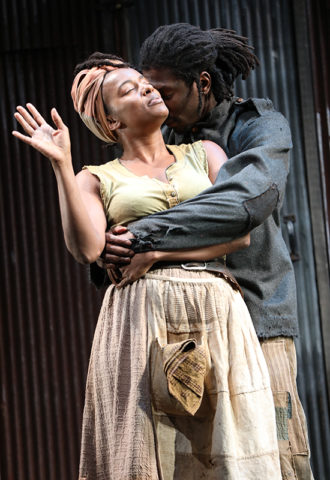Originally published in the Bay Area Reporter

Photo courtesy of A.C.T./Joan Marcus
Language that spans lifetimes
“True dat,” responds a trio of runaway slaves to a series of statements about the debilitating conditions endured by by Civil War-era blacks in Suzan-Lori Parks’ Father Comes Home From The Wars (Parts 1, 2 & 3), at San Francisco’s American Conservatory Theater (in a co-production with the Yale Rep) through May 20.
“True dat,” they repeat. “True dat.”
The audience responds with almost audible smiles, recognizing — perhaps consciously, perhaps not — Parks’ juxtaposition of her play’s 1860s setting with a vernacular expression that arose in African-American communities during the 1990s and remains common today.
In this and similar instances throughout the evening, Parks uses vocabulary to subtly elide past and present. The perverse moral relativism and psychological degradation institutionalized during the United States’ first century does not belong to the long ago and far away, she implies. Father Comes Home from the Wars is a history play only if one believes in living history.
Ingrained perspectives
Over the course of the play, audiences are forced to recognize the searing, indelible brand of slavery on American society: In the Confederate colonel whose sense of self-worth is dependent on seeing other people as inherently beneath him; in the ironically monikered slave, Hero, whose notions of loyalty are sufficiently twisted that he agrees to go into battle for the South, and who wonders if he’ll lose his value as a person if freedom means the evaporation of his $800 price tag.
Parks is attempting to correct any assumption that the Emancipation Proclamation put a hard stop to slavery’s effects. She is working to straighten our skewed historical record, to set it true. When she writes “True dat,” True is not just an adjective; it’s an action verb.
Unpacking this seemingly simple, briefer-than-a-minute incantation reveals Parks’ complex, layered artistry. Recognizing that she brings such fierce intelligence and challenging nuance to virtually every moment of her script’s nearly three hour running time is jaw-dropping.
And knowing that these tightly crafted acts are just the first third of an eventual nine-part epic is enough to make your head spin.
Assuming the best of one’s audience
In all fairness, some audience members will find the evening too dizzying to enjoy. The exquisite intricacy of Parks’ concept and language requires a level of sustained attention not often demanded of contemporary theatergoers. That Father Comes Home… and Angels in America are both gracing Bay Area stages this month is a tribute to the faith producers have in local audiences.
Like Tony Taccone’s Angels team at the Berkeley Rep, director Liz Diamond and company do an excellent job of bringing their script to life in a way that makes it absorbable for patient, focused viewers without ever turning any of the playwright’s provocations into ham-handed messages or morals.
Riccardo Hernandez’s spare scenic design and Yi Zhao’s lighting respect the primacy of the language here, quietly indicating shifts in landscape and in time without ever distracting from the dialogue. They also take a cue from the writer’s penchant for sophisticated references: Several backlit shadow tableaux evoke African-American visual artist Kara Walker’s paper silhouettes, which address issues that are also embedded in Parks’ play.
Progressive success
Part I, in which Hero (James Udom) decides to leave friends and family to join his master on the battlefield, is the muddiest portion of this production. Too many characters are introduced too quickly and with insufficient differentiation. At times, one begins to puzzle over the cast rather than parse the dialogue.
Part II is the most straightforward and accessible of the three, with just a trio of characters on stage: Hero, the Colonel (a wonderful sad-clown performance by Dan Hiatt) and a captive Union soldier (Tom Pecinka) with secrets to reveal. This mid-section does the clearest job of crystallizing Parks’ ideas and could easily, with the smallest of alterations, be performed as a stand-alone one act.
The production grows continually stronger, and by Part III — which tips into magic realism with Gregory Wallace’s dreadlock-swinging tour de force performance as a talking dog — audiences will find themselves simultaneously laughing aloud with the full cast of 11 and eagerly submitting as Parks ties them into an intellectual Gordian knot.
Prospective ticket buyers should understand that Father Comes Home From the Wars is in no way an escapist entertainment. It richly rewards close engagement and will yield endless hours of post-theater conversation and reflection. In her script, Parks makes repeated nods to Homer’s Odyssey. That’s fine company, indeed. But with her multifold meanings, sly humor and gift for transforming historical events into timeless meditations, the writer Parks most closely, astonishingly approaches is Shakespeare. True dat.
